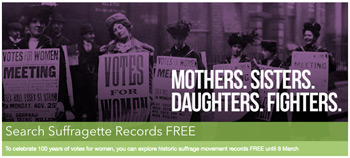The following news release is from FindMyPast. Click on the illustration or the links to check out this new collection.
● New Suffragette Collection containing over 3,000 Police and Home Office records now available to search online at Findmypast.
● This new collection will be completely free to search and explore until International Women’s Day on March 8th.
Thursday February 1st: British family history website Findmypast in association with The National Archives has launched a new online collection of government records that tells the stories of individuals who fought for women’s suffrage. The Suffragette Collection, digitised from original records at Kew, reveals the struggles endured by the movement’s most ardent supporters and highlights the State’s response as it attempted to contain them.
The Suffragette Collection consists of more than 3,000 Metropolitan Police and Home Office records, many of which are now available online to the public for the first time. It has been launched to mark the 100th anniversary of the passage of the 1918 Representation of the People Act, the act that gave property owning women and female graduates over the age of 30 the right to vote for the first time in British history.
Today’s release marks the first phase of this ground-breaking collection and additional records will be added throughout 2018. To celebrate this historic anniversary, Findmypast is making these new records completely free to search and explore until International Women’s Day (March 8th), allowing family historians to explore their connection to this pivotal period of British history.
The collection brings together the stories of women from all classes who actively supported women’s suffrage, either by attending demonstrations and meetings or opting for militant “direct action”. Researchers can expect to find photographs, cabinet office papers, calendars of prisoners and Home Office papers on suffragette disturbances and prosecutions. The collection also includes an index of women arrested between 1906 and 1914, the official police watch list recording the details of over 1,300 militant suffragettes, reports of prison conditions, force-feeding, police surveillance and much more.
Tamsin Todd, CEO of Findmypast, comments: “We are honoured to bring these important documents online for the first time. This new collection offers unique insight into the incredible sacrifices made by women who risked health, livelihood and liberty in the fight for the right to vote. The Suffragette Collection, together with Findmypast’s world class British & Irish family history collections, provides everyone with the opportunity to discover their family’s connection to this important historical movement.”
Victoria Iglikowski, Principal Records Specialist – Diverse Histories, at The National Archives, said: “The National Archives collection offers a fascinating insight into the campaign for women’s suffrage. Our records often highlight personal experiences of female and male campaigners in their own words. Many of the files provide a first-hand account of demonstrations, court cases, imprisonment and force feeding. What is revealed is a highly organised, national movement from the smallest villages to the biggest cities, crossing class lines, in the first step towards voting equality”.
The collection records cases of arson, window breaking, public disobedience, the destruction of post and the vandalism of artwork as well as protests targeting cabinet ministers and members of the Royal Family.
Key items included in the collection include:
● Detailed reports on the confinement of Suffragettes at prisons in London, Birmingham, Manchester, Liverpool, Bristol and Newcastle
● Home Office case files on the prosecution of prominent suffragettes and lawsuits brought against their supporters
● A detailed report on Emily Wilding Davison and her death after stepping in front of and being struck by King George V’s horse Anmer at the 1913 Epsom Derby
● Details of prominent male supporters including MPs, magistrates and other influential activists
● A secret service file on Sylvia Pankhurst
● Police files containing photographs and fingerprints
● Postcard photographs of leading Suffragettes and male actors lampooning them in female costume
● Government considerations of potential future targets including lighthouses, polling booths and Royal Parks
● An original address to Queen Victoria, mounted on silk
